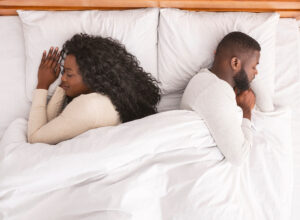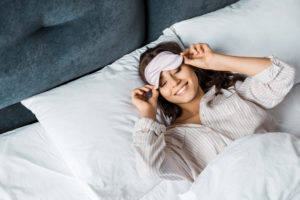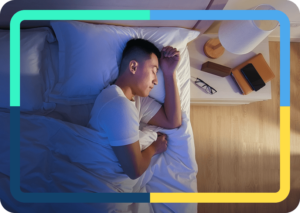Reading Before Bed
Many people have trouble falling asleep at least some of the time, and an estimated 15% of adults find it hard to fall asleep most nights. While some sleep difficulties ultimately require medical treatment, establishing healthy sleep habits can make it easier to fall asleep and stay asleep. Regularly reading before bed is one habit that is budget friendly, easy to do, and accessible to people of all ages.
What Are the Benefits of Reading Before Bed?
Research suggests that people who read before bed generally sleep better, wake up less often, and sleep for longer than people who go to bed without reading. Experts have offered several explanations for the benefits of bedtime reading.
- Bedtime routine: Reading before bed can be part of a bedtime routine that, when carried out regularly, signals to the brain that it’s time to sleep.
- Physical relaxation: When a person reads in bed, their heart slows and their muscles release tension, allowing the body to relax.
- Mental health benefits: Reading at bedtime may calm the mind and keep it from dwelling on stressful circumstances.
- Alternative to screen time: For some people, reading at bedtime occupies time that would otherwise be spent in front of screens, which is helpful because exposure to light from electronic devices can negatively affect sleep.
What Types of Books Are Best at Night?
Any kind of book that allows a person to relax is a good choice for bedtime reading. Avoid any book with content that could elevate your heart rate or cause emotional distress – like horror or thriller novels. Readers should also avoid page-turners that might keep them up past their usual bedtime.
Those looking for benefits beyond a good night’s sleep might choose books instead of magazines or newspapers, as book reading is associated with cognitive gains, social intelligence, and longer lifespans. Reading fiction, particularly literary fiction, can also positively affect mood and emotions. Ultimately, however, the best book to read at bedtime is largely a matter of personal preference.
Are Electronic or Paper Books Preferred at Bedtime?
Although e-readers are convenient and popular, they emit blue light, which inhibits the production of the sleep hormone melatonin. This can make it harder to fall asleep. While some e-readers allow users to adjust settings to limit blue light emissions, all of them emit at least some blue light—so, for now, traditional hardback or paperback books are a better choice for bedtime reading.
How Do Audiobooks Affect Readiness to Sleep?
Like reading, listening to an audiobook every night can be a part of an effective bedtime routine that helps a person wind down. That said, audiobooks do not have the same beneficial effects on sleep quality as reading. People who don’t want to or are unable to read a book and who find that audiobooks aren’t helping them sleep might try listening to soothing music instead.

Does Reading to Children Help Them Sleep?
Reading to children can be part of a bedtime routine that helps them sleep well. Children who spend time partaking in family activities, like reading bedtime stories together, are less likely to have trouble falling asleep than children who watch television or play video games before bed. And children whose caregivers read to them tend to see improvements in their behavior, health, and language development.
Tips to Add Reading to Your Bedtime Routine
To maximize the benefits of reading before bed, consider incorporating these sleep hygiene practices into your bedtime routine.
- Begin and end your bedtime routine at the same time every night.
- Dim the lights and turn down the thermostat at the start of your bedtime routine.
- Do other relaxing activities, such as gentle stretching or taking a warm bath, before settling into bed to read.
- Avoid alcohol and nicotine in the hours leading up to bed.

Still have questions? Ask our community!
Join our Sleep Care Community — a trusted hub of sleep health professionals, product specialists, and people just like you. Whether you need expert sleep advice for your insomnia or you’re searching for the perfect mattress, we’ve got you covered. Get personalized guidance from the experts who know sleep best.
References
4 Sources
-
Finucane, E., O’Brien, A., Treweek, S., Newell, J., Das, K., Chapman, S., Wicks, P., Galvin, S., Healy, P., Biesty, L., Gillies, K., Noel-Storr, A., Gardner, H., O’Reilly, M. F., & Devane, D. (2021). Does reading a book in bed make a difference to sleep in comparison to not reading a book in bed? The People’s Trial-an online, pragmatic, randomised trial. Trials, 22(1), 873.
https://pubmed.ncbi.nlm.nih.gov/34996514 -
Bavishi, A., Slade, M. D., & Levy, B. R. (2016). A chapter a day: Association of book reading with longevity. Social science & medicine (1982), 164, 44–48.
https://pubmed.ncbi.nlm.nih.gov/27471129 -
Carney, J., & Robertson, C. (2022). Five studies evaluating the impact on mental health and mood of recalling, reading, and discussing fiction. PloS one, 17(4), e0266323.
https://pubmed.ncbi.nlm.nih.gov/35395034 -
Dickson, G. T., & Schubert, E. (2020). Music on Prescription to Aid Sleep Quality: A Literature Review. Frontiers in psychology, 11, 1695.
https://pubmed.ncbi.nlm.nih.gov/32849025


















































